Gardening Helping the Environment
How Does Gardening Help The Environment
Gardening and Its Incredible Impact On The Environment
It's no surprise that gardening is an amazing pastime with multifarious benefits, however it's only recently that we're understanding its total impact on the environment. It has been used for thousands of years to produce food, provide livelihood, purify air and water, create habitats, and boost well-being. Let's explore all the environmental benefits that come with gardening.
The Soil
The soil is the basis of all life. It is the foundation on which everything else depends. Well-cared-for soil is a complex and dynamic resource, and any gardening activity directly affects its habitats. Studies suggest that soil can hold up to five times as much carbon as the atmosphere, and it may be the best tool for combating global warming and other environmental challenges. Gardening can help keep the soil healthy and nutrient-rich, and improves its water retention capability, helping plants thrive and making the land more resilient in the face of climate change.
Air Quality
Indoor air quality can be compromised due to allergens, pollution, and household chemicals. Plants are natural air purifiers. Many house plants can help clear the air of pollutants such as benzene, formaldehyde, and trichloroethylene. Gardening outdoors can have an even greater effect on air quality. The more vegetation, the better the air quality. Chlorophyll present in greenery absorbs carbon dioxide and releases oxygen, which is essential for healthy breathing and human life.
Ecosystems and Biodiversity
The effects of gardening on ecosystems and biodiversity are wide-ranging. Gardens provide habitats for a variety of species, increasing local biodiversity. Planting native species encourages the diversity of wildlife, and increases a garden's suitability for hosts of beneficial insects, birds, and mammals that in turn support a thriving ecosystem. So managing a garden carefully can positively benefit a large area, contributing to the health of local life and ultimately to the health of entire continents.
Stress Reduction
Gardening has been shown to reduce stress, boost self-esteem and foster emotional and psychological healing. Studies have revealed that spending time in nature results in subjective well-being and that people's moods generally improve after spending time outdoors. Gardening also has the added benefit of increasing physical health and providing access to healthy and fresh foods.
Mode of Waste Management
Organic waste is one of the most prevalent forms of waste in modern life. Composting opens the door to several worthwhile opportunities for the safe and mature disposal of organic waste and to the eventual creation of nutrient-rich soil known as humus. Composting also reduces the overall amount of methane emissions generated by the decomposition of organic matter, which is a major driver of global warming. Even though it may not seem significant, composting organic material is still one of the most efficient methods for waste management.
Green Job Opportunities
Green job opportunities are becoming increasingly important as efforts to promote sustainability move from paper plans to reality. Gardening is becoming increasingly popular in cities as well as neighborhoods, and it's one of the green job opportunities that individuals are taking advantage of to create a living. Jobs offered range from designing the space to nurturing plants to harvesting crops, and they create both short-term and long-term sustainability solutions.
Resource Conservation
Gardening has the potential to conserve natural resources. By using fewer chemicals and fertilizer, you will reduce the amount of runoff water, which carries toxins into waterways, and pollutants into the atmosphere. Raised-bed gardening allows one to conserve water and energy, since it helps reduce the need for frequent weeding, which encourages water loss.
Climate Change Mitigation
The impact of climate change can be reduced through gardening. Planting vegetation is key to capturing carbon dioxide, one of the major causes of climate change. Planting trees and shrubs in a garden helps absorb CO2 from the atmosphere, helping to reduce the effects of global warming.
Education
Gardening has the potential to educate individuals of all ages. It provides a great platform to observe the natural world by teaching children about food production and sustainability. In urban settings, gardens can also provide an understanding of nature in a safe, practical way. And through gardens, parents can teach their children the importance of conservation, biodiversity, and stewardship, along with other life lessons.
Final Word
Gardening is an incredibly beneficial pastime with many environmental, economic, and social benefits. With just a little bit of effort, it can enrich our ecosystems, benefit our health, and in the long term, help to mitigate climate change. All in all, gardening is an activity that's worth your time and energy if you want to contribute to a better world.

Previous Page
Next Page